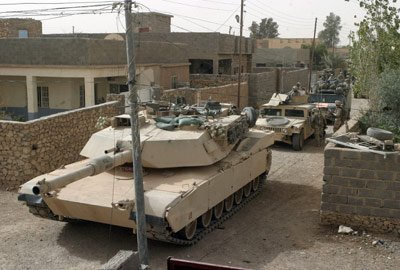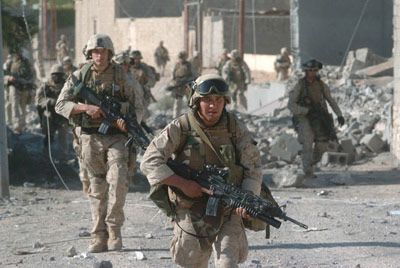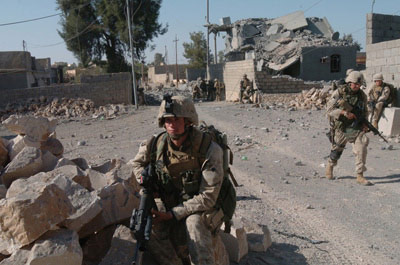Update on Steel Curtain
An article at the Marine Corps Times says operations in Husaybah have concluded and are moving on to Karabilah. (See map here.)
More evidence that the initial attack came from an unexpected direction.
A comment on the purpose of the operations.
Note, a "squeezed in" terrorist is a dead terrorist.
As this article says, one reason the terrorists may have thought the attack was coming from the east is because the Marines had occupied fire bases near Karabilah.
I love the Marines and their penchant for plopping down in the middle of bad guy territory, forming fire bases, and saying "We're here. Whaddya going to do about it?"
This line of fire bases may form one leg of the triangle mentioned above. The attack coming from the west may be trying to drive the terrorists against this leg.
CentCom has released news from the fourth day of Operation Steel Curtain.
Note the emphasis on the fact so many of the terrorists are foreign fighters, i.e. from outside Iraq.
I have been keeping track of facilitators killed in these western river towns. Several of them were not Iraqi, but being facilitators, all were connected to threads running outside of Iraq. Here's the current list.
* Abu Ali had Al Qaeda connections in Syria and Saudi Arabia.
* The Sheik had connections in Yemen, Morocco, Saudi Arabia, Kuwait and Syria.
* Abu Dua had al Qaeda connections in Syria and Saudi Arabia.
* Abu Mahmud was believed to be a Saudi.
* Abu Sa’ud was a Saudi extremist.
* Abu Asil was a North African terrorist.
The Saudis are hip deep in supporting terrorism, especially financially, though many donations may be from private sources, not government coffers. Saudi money is oil in the gears of terrorism. Note how many of the above facilitators were either Saudi, or had connections in Saudi Arabia. Whether the government of Saudi Arabia is actively supporting these operations, I don't know. But surely a police state like Saudi Arabia knows what is going on, and at best the government is turning a blind eye to these activities. So far, the United States has been mostly silent in public on Saudi support for the terrorists in Iraq.
On the encouraging side, local Iraqis are involved in Steel Curtain.
The experience and the confidence Iraqi soldiers will gain as they participate in real-life, live-fire combat operations will serve them well in the future.
-----
Operation Steel Curtain - Nov 5
Operation Steel Curtain - Day 3 - Nov 7
-----
Bill Roggio has an interview with Colonel Stephen W. Davis, the Commander of Marine Regimental Combat Team - 2, who says "Husaybah has been cleared and secured".
 |
| A tank and vehicles of 3rd Battalion, 6th Marines, stand by while Marines and Iraqi Army soldiers clear houses during Operation Steel Curtain, in Husaybah, Iraq, on Monday Cpl. Neill A. Sevelius / U.S. Marine Corps / AP Photo |
Two thousand Marine infantrymen completed a four-day sweep through the city Tuesday and continued their advance into a suburban strip leading east to the riverside town of Karabilah.
There were few significant engagements between U.S. and insurgent forces Tuesday. An improvised bomb caused minor injuries to three members of 2nd Battalion, 1st Marine Regiment, as they marched down a dirt street in what the Marines have dubbed the "H&K Triangle," a wedge of residential neighborhoods between densely urban Husaybah and more rural Karabilah in western Iraq.
Shortly after dawn, 2nd Battalion, 1st Marines and 3rd Battalion, 6th Marines advanced the final few blocks of Husaybah, which sits near the Euphrates’ crossing of the Syria-Iraq border.
 |
| Marines with Echo Company, 3rd Platoon, 2nd Battalion, 1st Marine Regiment, make their way through eastern Husaybah, Iraq, on Sunday Rick Kozak / Military Times |
More evidence that the initial attack came from an unexpected direction.
They found evidence of that Tuesday morning — several fortified positions oriented to the east, including two houses with artillery rockets and improvised firing tubes, aimed in the opposite direction of the Marine advance.
"I expected more built-up positions," said Lance Cpl. Tyler Skjellerup, 20, of Boonville, N.Y., a member of 3/6’s Kilo Company weapons platoon. "They didn’t expect us to come from this direction."
 |
| Lance Cpl. Tyler Sytsma, 19, of Minneapolis, with Echo Company, 3rd Platoon, 2nd Battalion, 1st Marine Regiment, stops to rest as his comrades make their way through eastern Husaybah, Iraq, on Sunday Rick Kozak / Military Times |
A comment on the purpose of the operations.
Now, if Steel Curtain has gone according to plan, those insurgents are now squeezed into Karabilah, especially a triangle-shaped part of town ominously nicknamed the Shark Fin.
Note, a "squeezed in" terrorist is a dead terrorist.
As this article says, one reason the terrorists may have thought the attack was coming from the east is because the Marines had occupied fire bases near Karabilah.
The long movement was an attempt to surprise insurgents in the city, who Marine commanders believe were expecting any assault to come from the east, in the neighboring village of Karabilah, where Marines hold a line of small firebases occupied during fighting in October.
I love the Marines and their penchant for plopping down in the middle of bad guy territory, forming fire bases, and saying "We're here. Whaddya going to do about it?"
This line of fire bases may form one leg of the triangle mentioned above. The attack coming from the west may be trying to drive the terrorists against this leg.
CentCom has released news from the fourth day of Operation Steel Curtain.
Note the emphasis on the fact so many of the terrorists are foreign fighters, i.e. from outside Iraq.
Coalition and Iraqi forces continue to detain terrorists as they fight their way through the city. A number of the detainees have been foreign fighters who originated from various countries within Asia and Africa.
The majority of foreign fighters come to Iraq through Syria where they cross the border into Iraq and meet with members of al Qaeda in Iraq (AQI), the leadership of which is also comprised of mostly foreign nationals.
Until Operation Steel Curtain, Husaybah was an important command and control center where these foreign fighters were trained and dispatched throughout the country to wage war against the Iraqi people and Coalition Forces.
There are approximately 180 men being detained for questioning about suspected ties to the insurgency. The overall percentage of foreign fighters that make up that total is unavailable at this time.
I have been keeping track of facilitators killed in these western river towns. Several of them were not Iraqi, but being facilitators, all were connected to threads running outside of Iraq. Here's the current list.
| Facilitator | Killed in | Date killed |
| Abu Ali | Jaramil | Sept 7 |
| The Sheik | Ubaydi | Sept 10 |
| Abu Nasir | Ushsh | Sept 26 |
| Abu Dua | Ushsh | Oct 26 |
| Abu Mahmud | Husaybah | Oct 28 |
| Abu Sa'ud | Ubaydi | Oct 29 |
| Abu Asil | Husaybah | Oct 29 |
| Abu Umar | Ubaydi | Oct 31 |
| Abu Asim | Husaybah | Nov 2 |
* Abu Ali had Al Qaeda connections in Syria and Saudi Arabia.
* The Sheik had connections in Yemen, Morocco, Saudi Arabia, Kuwait and Syria.
* Abu Dua had al Qaeda connections in Syria and Saudi Arabia.
* Abu Mahmud was believed to be a Saudi.
* Abu Sa’ud was a Saudi extremist.
* Abu Asil was a North African terrorist.
The Saudis are hip deep in supporting terrorism, especially financially, though many donations may be from private sources, not government coffers. Saudi money is oil in the gears of terrorism. Note how many of the above facilitators were either Saudi, or had connections in Saudi Arabia. Whether the government of Saudi Arabia is actively supporting these operations, I don't know. But surely a police state like Saudi Arabia knows what is going on, and at best the government is turning a blind eye to these activities. So far, the United States has been mostly silent in public on Saudi support for the terrorists in Iraq.
On the encouraging side, local Iraqis are involved in Steel Curtain.
The scout platoons assigned to the combat units clearing the city, commonly known as Desert Protectors, continue to assist both Iraqi and U.S. forces. Because of their familiarity with Husaybah, the region, local tribes and dialects, these scouts are able to pick out suspicious individuals for further questioning. Those individuals not associated with the insurgency will be released.
This is the first operation in which these locally recruited and specially trained scout platoons have been employed. As the number of Iraqi Army Soldiers grows in al Anbar, more locally recruited Soldiers will swell their ranks. Currently, there are more than 15,000 Iraqi Army Soldiers serving in al Anbar.
The experience and the confidence Iraqi soldiers will gain as they participate in real-life, live-fire combat operations will serve them well in the future.
-----
Operation Steel Curtain - Nov 5
Operation Steel Curtain - Day 3 - Nov 7
-----
Bill Roggio has an interview with Colonel Stephen W. Davis, the Commander of Marine Regimental Combat Team - 2, who says "Husaybah has been cleared and secured".








1 Comments:
At Mon Nov 14, 04:06:00 PM, Mixed Humor said…
Good recap Jeff...enjoyed the photos too.
Post a Comment
<< Home